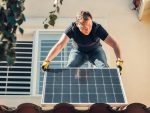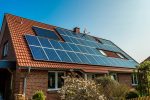5 domestic renewable energy systems
Are you tired of relying on traditional energy sources that harm the environment and drain your wallet?
Look no further! This article will explore five domestic renewable energy systems that can help you break free from fossil fuels and reduce your carbon footprint. You can generate clean and sustainable energy right at home by harnessing the power of the sun, wind, earth’s natural heat, organic matter, and water.
With the help of a trusted supplier and installer, it has always been challenging to get domestic renewable energy systems for your home. Whether you’re looking for discrete options like solar tiles or something sturdy like a wind turbine, there are plenty of ways to embrace sustainable energy sources.
Solar Panels: harnessing the power of the sun
Solar panels are a great way to generate clean and renewable energy for your home. They work by converting sunlight into electricity, which can be used to power your appliances and reduce your reliance on traditional fossil fuels.
Installing solar panels is a smart investment that helps the environment and saves you money in the long run. As you generate electricity, you become less dependent on utility companies and their ever-increasing rates.
With technological advancements, solar panels have become more efficient and affordable. Various types of solar panel systems are available, ranging from rooftop installations to ground-mounted ones. You can even opt for solar tiles or integrated solar panels if you prefer a discreet ‘barely there’ aesthetic.
Additionally, many governments and organisations offer incentives and tax credits for those who go solar. So why wait? Start harnessing the sun’s power today by installing solar panels on your roof!

Wind Turbines: Capturing the energy of the wind
Imagine harnessing the power of the wind with efficient and modern turbines, capturing its energy to fuel your home.
Wind turbines are a popular form of domestic renewable energy system that can provide a sustainable and clean source of electricity. These tall structures have large rotor blades that spin when the wind blows, converting the wind’s kinetic energy into electrical energy.
The electricity generated by wind turbines can power various appliances in your home, reducing your reliance on traditional fossil fuels and decreasing your carbon footprint.
While the initial installation costs may seem high, wind turbines can pay for themselves over time through lower electricity bills. Additionally, many governments offer incentives and grants for installing renewable energy systems like wind turbines, further offsetting the initial investment.
Moreover, as technology advances, wind turbines become more efficient and productive, allowing you to generate even more electricity from each turbine.
Harnessing wind power through modern and efficient turbines is an exciting prospect for homeowners looking to embrace renewable energy sources. Not only do wind turbines provide a sustainable solution for powering your home, but they also help reduce greenhouse gas emissions and combat climate change.
So why not take advantage of this incredible resource? By investing in wind turbines, you can contribute to a cleaner and greener future while saving money on your energy bills at the same time.

Geothermal Heat Pumps: utilising the earth’s natural heat
Geothermal heat pumps are innovative systems that harness the steady temperature underground to provide heating and cooling for homes and buildings.
Using a network of pipes buried beneath the ground, geothermal heat pumps extract heat during winter and transfer it indoors, keeping you snug even on the coldest days.
In the summer, they work in reverse, removing excess heat from your home and releasing it into the cooler earth below. This efficient process keeps you comfortable year-round, significantly reduces energy consumption, and lowers utility bills.
Geothermal heat pumps have numerous advantages over traditional heating and cooling systems. Firstly, they’re highly efficient since they don’t burn fossil fuels or rely on electricity for heating. Instead, they tap into a sustainable energy source that’s constantly replenished by nature.
This benefits homeowners financially and contributes to a greener planet by reducing greenhouse gas emissions. Moreover, these systems are durable and require minimal maintenance compared to other HVAC options.
With proper installation and regular servicing, geothermal heat pumps can last decades without losing efficiency or performance.
So, if you’re looking for an environmentally friendly way to stay cosy throughout the year while saving on energy costs, consider embracing geothermal technology – it’s a win-win situation!
Biomass Boilers: turning organic matter into energy
Step into the world of biomass boilers and witness the transformation of organic matter into a sustainable source of heat and power.
Biomass boilers are designed to burn various organic materials, such as wood pellets, agricultural waste, or even dedicated energy crops. These boilers utilise combustion to release the stored energy within these materials, generating heat that can be used for space heating or hot water production.
The combustion process is carefully controlled to ensure efficient burning and minimal emissions. One of the key advantages of biomass boilers is their ability to use renewable resources that would otherwise go to waste.
By converting organic matter into energy, biomass boilers help reduce dependency on non-renewable fossil fuels like coal or oil. This helps mitigate climate change by reducing carbon dioxide emissions and promotes local economic development by creating jobs in the forestry and agriculture sectors.
Also, biomass boilers provide a reliable and consistent source of heat and power, making them suitable for residential and commercial applications.
So why not embrace this eco-friendly technology and harness the potential of organic matter to meet your heating needs while contributing to a greener future?
Small-scale hydropower: tapping into the power of water
Utilising the force of flowing water, small-scale hydropower systems harness the raw power of nature to generate electricity. With a small-scale hydropower system, you can tap into the energy potential of nearby rivers, streams, or even your backyard waterfall.
Here are four reasons why small-scale hydropower is an excellent option for domestic renewable energy:
- Renewable and sustainable: Unlike fossil fuels, water is a renewable resource that will never run out. As long as there is flowing water, you can continue to generate electricity without depleting natural resources.
- Low environmental impact: Small-scale hydropower systems have minimal environmental impact compared to large-scale dams. They do not require vast reservoirs or significant alterations to natural landscapes, preserving ecosystems and maintaining biodiversity.
- Cost-effective: Once installed, small-scale hydropower systems offer long-term cost savings. The upfront investment may be higher than other renewable energy options, but the maintenance costs are relatively low. Additionally, you can sell excess electricity back to the grid, further offsetting your expenses.
- Reliable and consistent power generation: Flowing water provides a steady energy source, ensuring reliable power generation throughout the year. Unlike solar or wind power, small-scale hydropower offers a stable and constant supply, which may fluctuate depending on weather conditions.
By harnessing the power of flowing water with a small-scale hydropower system in your home or property, you can reduce your carbon footprint while enjoying reliable and sustainable electricity generation.
Which domestic renewable energy system will you choose?
In conclusion, you now clearly understand five domestic renewable energy systems that can help you reduce your carbon footprint and save money on your energy bills.
By installing solar panels on your roof, you can harness the sun’s power and generate clean electricity for your home.
Wind turbines are another great option, allowing you to capture the energy of the wind and convert it into usable power.
Geothermal heat pumps are a fantastic way to utilise the Earth’s natural heat, providing efficient heating and cooling for your home throughout the year.
Biomass boilers offer a sustainable solution by turning organic matter into energy, reducing waste and dependence on fossil fuels.
Lastly, small-scale hydropower systems tap into the power of water to generate electricity in an environmentally friendly manner.
Incorporating these renewable energy systems into your home will contribute to a greener future and enjoy long-term cost savings. So why wait? Please take action now and positively impact both our planet and your wallet by embracing these domestic renewable energy solutions today!
![[AD] ✨ Festive magic for local families in the heart of Guildford ✨
We had the loveliest evening exploring the @guildfordilluminate light trail at Guildford Castle
The trail takes around 30–40 mins
with cosy stops for hot chocolate and toasting marshmallows, it’s a gorgeous Christmas activity for Surrey families.
It’s on until 4th January and makes the perfect festive plan:
🛍️ Christmas shopping in town
✨ The light trail
🍽️ Finish with dinner in Guildford
If you’re looking for a magical, stress-free festive outing with the kids — this is one to add to your Christmas list
📍 Guildford Castle, Castle St, Guildford GU1 3SX
#GuildfordWithKids #SurreyFamilies #ChristmasInSurrey](https://suburban-mum.com/wp-content/uploads/2018/09/589257185_18566118850016840_4432952740767953046_n-180x320.jpg)
![[AD] We went to the newly opened Cha Sha Kingston a couple of weeks ago, and wow — taste bud adventure unlocked! The boys devoured the masala fries and chicken tikka rolls, while we couldn’t get enough of that epic kebab butter curry 😍🍛.
It’s amazing value for food this tasty (and everyone left happy and VERY full!).
Delicious food, vibrant vibes and incredible value — the perfect combo for your next meal.
📍Cha Sha Kingston
43 Surbiton Road, KT1 2HG
🌐 chasha.co.uk
Other Cha Sha locations in Birmingham, Ilford, Southampton and Wembkey
#ChaSha #ChaShaKingston #KingstonEats #FoodieFinds #UKFoodie #FoodReview #KingstonUponThames #FamilyEats #FamilyDining #FoodieKids](https://suburban-mum.com/wp-content/uploads/2016/02/574770541_18560351146016840_6855048070839528040_n-180x320.jpg)

![[AD] We’re a cricket-mad family, so we’re buzzing that @thehundred is back this August! 🏏🔥
To get ready, M tried out the official FREE Activity Pack — and it’s brilliant! 🙌
Packed with fun games, creative challenges and sporty tasks, it’s perfect for getting kids hyped whether you’re at home or on the go.
👉Download yours now (link in bio)
@londonspirit @ovalinvincibles #EveryMomentCounts #TheHundred
#EnglandCricket #CricketFamily #TheHundredCricket #LondonBloggers #Cricket #CricketIsLife #kidsfun](https://suburban-mum.com/wp-content/uploads/2022/11/505472555_18531279601016840_7092520074819907569_n-180x320.jpg)



![[AD - Press visit]
We enjoyed the glorious sunshine this weekend with a trip to Brighton. We went on the @brightoni360official which is right by the sea front.
The i360 pod take a slow journey up, allowing you to take in views across Brighton and the South Downs 450ft above ground. There’s a bar inside with drinks and snacks available to purchase and the experience lasts 25 minutes.
Afterwards, we headed to the open air roller rink for a roller skating session!
The roller rink is:
⭐ Suitable for over 5s
⭐ £6.50 if you have your own skates or £9.50 if you need to hire them
⭐ 45 minutes per session
Full details to visit the i360 + skating
📍 Brighton i360, Lower Kings Road, Brighton BN1 2LN
🚗 Parking nearby (we parked in the Regency Square Car park)
🎟️ Prices start from £25.40 for an adult and £16.90 for a child
🕐 Opening hours are currently Sun-Fri 10.30am-18.30pm and until 19.30pm on Saturdays
☕️ Bar inside the i360, cafe and gift shop
Book tickets here:
https://tickets.brightoni360.co.uk/tickets/?_ga=2.195305772.1869001490.1689671753-1757164059.1689671753/#events?eventid=157](https://suburban-mum.com/wp-content/uploads/2015/04/417980235_313576471048632_3682382982231216432_n.jpg)

![[AD] ***Summer of fun at Barracudas Activity Camps!****
There is plenty for kids to do at @barracudas_activity_day_camps
From Tennis, Archery, Swimming, Motor Sports and more you can be sure that there will be something for kids aged 4.5-14. ⚽🏈🥅🎾🏓🏎️🏹🏊♂️🏉
You can book on a day by day basis - so it can fit in with any other days out/activities you have planned and there are early drop off and late pickup options available. Barracudas are also Ofsted registered so you can use your Childcare Vouchers too.
⭐⭐⭐Get £20 off a week or £4 off a day using my discount code: MARIA20⭐⭐⭐
#BarracudasActivityDayCamp #BarracudasActivityCamp #BarracudaAmbassadors #SummerHolidays #SchoolHolidays #Summer2023 #SummerCamp #DayCare #Camp #KidsCamp #surreymummy #surreymums #SummerOfFun #ActivityCamps #HolidayCamps #Childcare #SchoolHolidays #schoolholidaycamps](https://suburban-mum.com/wp-content/uploads/2024/07/353583570_625625966167953_545896259645102575_n.jpg)



![[AD] We have some super exciting news...we have been chosen to be Laser Quest Ambassadors, and the boys are over the moon!
We are really lucky that our local Laser Quest (@laserquestkingston) is just around the corner from us. It means we can pop in of a weekend or anytime during the school holidays, and with summer just around the corner, I know Laser Quest will be one of our go-to places for some family fun.
As well as games of Laser Quest, there are also VR experiences and arcade amusements too. To find out a bit more about how Laser Quest works, you can read my blog post: https://www.suburban-mum.com/laser-quest-kingston/ (clickable link in bio)
Don't forget to keep an eye out for our Laser Quest posts - I'm going to be giving away two family passes to use at Laserquest Kingston!
If you can't wait and want to head down to Laser Quest to try it out, use the code SUMMER30 for 30% off your booking. The code is valid from now until the end of August 2023 and can be used on Laser Quest games and birthday party bookings.
#LaserquestAmbassador #Laserquest #LaserquestKingston #ActivitiesForKids #FamilyFun #DaysOutWithKids #Lasertag #LaserquestVR #Kingston #ThingsToDoInKingston #SurreyFamilyDaysOut #ThingsToDoWithKids #RainyDayFun #SurreyMummy #SurreyLife #LifeWithKids #LifeWithBoys #familyfunday](https://suburban-mum.com/wp-content/uploads/2015/04/353230107_797358078406942_2405522556733455165_n.jpg)

![[AD] The sun has finally made an appearance and the boys have been making the most of it by spending it
in the garden.
They’re go-to is always football and they’ve been trying to improve their aim and accuracy with the new Messi Foldable Footlball goal from the #MessiTrainingSystem range.
I love the fact the goal is foldable, making it easy to store away when not in use. It is also lightweight so you can effortlessly pack it up and take it to the park or to a friend’s house.
The Messi Foldable Football Goal retails at £36 and can be purchased from @argos
You can read my full review here: https://www.suburban-mum.com/messi-foldable-football-goal/
#TrainLikeMessi #FoldableFootballGoal #FootballSkills #OutdoorFun #LionelMessi #LeoMessi #FootballAtHome #OutdoorKids #JustGetOutside #OutdoorsAndFree #ScreenFreeKids #WhateverTheWeatherKids @flair_gp](https://suburban-mum.com/wp-content/uploads/2015/04/341194882_615024710178056_41977149395989448_n.jpg)

![[AD] We are absolutely thrilled to announce that we are Barracuda Ambassadors again this year.
With Easter just around the corner, the boys were sent the @barracudas_activity_day_camps new camp kit in preparation for the school holidays.
There’s a wide range of activities for kids aged 4.5 - 14 including Tennis, Archery, Basketball, Arts & Crafts and more.
If you like the sound of Barracudas, find out more over on their website. You can also save £20 a week or £4 a day, using my discount code: MARIA20](https://suburban-mum.com/wp-content/uploads/2024/07/336812306_765234558514317_685553691647241974_n.jpg)





